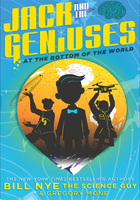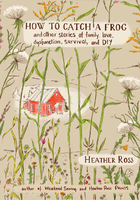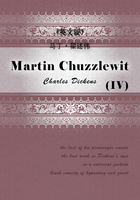The hour was half over and Sarah had still not told the shrink about stealing the handbag from Bonwit Teller. She had told her nothing, really; she had kept silent for most of the time.
Sarah turned to the shrink who sat there looking and not looking—the professional's attitude of attention—and took her in once again, quite frankly staring at her. She was absurd, ridiculous. She was unattractive, even for a shrink. With her light blue suit and low heels, she looked mannish. No, she looked—Sarah searched for the word—bulky. Yet her clothes were good, well-cut and expensive, and her short wiry hair was freshly done. She was smart. She could talk authoritatively on any subject. Why then did she strike Sarah as ridiculous?
At last the shrink noticed that Sarah was staring.
"Yes?"
This was why she was ridiculous, this business of saying, Yes? The shrink was from Brooklyn, Sarah knew, and yet she affected this Viennese intonation—Yes? No? I am right?—and sometimes even an accent. She was absurd. No?
"Yes? You would tell me something?"
"There's a man who follows me."
The shrink nodded imperceptibly and said nothing.
"He has a scar on his upper lip."
"A harelip."
"No, it's not a harelip. It's nothing like that. It's a slight line—right here—in the center of his upper lip, like a scar that's pulled the skin around it tight. It's not even noticeable until you notice it." She smiled. "I mean, when you do notice it, it's not at all unpleasant. It's attractive even."
"Attractive?"
"It sets him apart."
Neither of them spoke for a minute, and Sarah became aware of the echo of her voice, a light sound, very slow, as if she were searching for the words. "It sets him apart," she said again, not because it was important, but because she wanted to hear how she must sound to this absurd woman who always made her feel so bad. But whom she needed. Whom she could not live without.
"And this interests you? Pleases you, perhaps? That he is set apart, by a scar on his upper lip?"
"He stands outside my house sometimes. Last night he was on the other side of the Square, just standing and looking. The lights were out. I was in my bedroom, standing at the window, looking back. He didn't know I was there."
"No."
"We were looking at each other in the dark and he didn't know it."
"No."
"I don't know his name."
"No."
"I met his wife. Last week, on Friday, Angelo and I had supper and then we went for a walk by the river and on the way back we met them coming out of La Cigale. Angelo has been after him, you know, propositioning him the way he propositions everybody, and when we saw them coming out of the Cigale, Angelo said, 'Well, hello again,' pretending he knew them. And then he introduced me, and so the man who's been following me had to introduce his wife, but I never found out his name at all. Her name is Claire."
"Why do you suppose this man, with his scar and his wife, didn't say to Angelo, 'I'm afraid you're mistaken. I'm afraid we've never met.' Wouldn't that make more sense than introducing you to his wife?"
"Oh, he couldn't say that."
The shrink waited, but Sarah offered no further explanation.
"He couldn't say that?"
"Oh, no. He's guilty, you see. Angelo has seen him following me, and of course he knew that Angelo knew."
"And he didn't want his wife to know."
Sarah nodded, smiling a little. "Claire," she said, making the sound ugly.
"Let us go back. There is a man following you. He stands outside your window each night…"
"Not every night. Some nights only. And sometimes in the day."
"He stands outside your window. You've met his wife. What does he want, this man with the scar? Why is he following you?"
"He started following me nearly two weeks ago. I came out of Bonwit Teller and I thought someone was following me, so instead of coming straight home, I made a square. I went up to Dartmouth and then over past Commonwealth to Marlborough and then back down Marlborough to the Gardens. He followed me."
The shrink nodded.
"It was the day I took the handbag."
The shrink suddenly sat forward, all attention.
"From Bonwit Teller," Sarah added.
"Yes?"
"I stole it. Nothing happened. I made sure there was no alarm tag attached."
"Yes?"
"Besides, Angelo was watching."
"And how did you feel?"
"I didn't feel anything."
"Nothing?"
"That's why I took it."
"Tell me, when you feel you want to."
"There's nothing to tell."
"It was a fugue state?"
Immediately, Sarah wanted to run. The room was too close, there was no air, she was being smothered. But if she ran, they would say she needed closer watching. They would sedate her again. They would lock her up. This shrink, this ridiculous woman, was her only hope. And she had done nothing this time. Nothing. She had merely stolen the handbag.
"You were in a fugue state?"
"Yes."
"And how do you feel now?"
"I feel bad."
"Yes."
"I don't want to be sick again. I don't want to hurt anybody. I want to be like everybody else."
"Yes."
"I want… someone. I want to love someone."
"You want to be loved; that's what you want. It's normal to want to be loved. But you know about the stealing. You know…" And then she fell silent.
"I try. I try so hard."
The shrink shifted in her chair. Her job was to lead this poor girl, not to push her. Deliberately, she looked at her watch. But Sarah said nothing.
"Your period? You are having it now?"
"I've just had it."
"And there were no—correct me if I am wrong—fixations? About the blood?"
"No."
"About the smell?"
"No."
"There were no fixations about the—correct me—language of sex?"
"No. Nothing like that. It was normal. I just bled like everybody else."
"Ah." The shrink sat back, relieved. "Now let us return to this handbag. Yes?"
Sarah nodded, relieved, too.
"This handbag. What did you do with it?"
"It's in the drawer with the others. In my studio."
"And what else is in the drawer?"
"Nothing."
"And why is that? Why are these stolen handbags given a home of their own, as it were?"
"I don't know."
"Well, think about that, and we'll see each other in a week."
What was there to think about? That she kept her crazy life separate from her sane life? Didn't everybody? What did this woman mean? What did she want? Sarah sat up on the couch, dizzy suddenly, exhausted. She wanted to lie down again and go to sleep, right here in this awful woman's office, where she was safe and pretty.
"I won't see him," she said. "I won't have anything to do with him."
"Next week," the shrink said.
"There's no connection. I'm sure, I'm absolutely sure there's no connection between that man and the handbag. I'm sure of it."
"Next week."
Sarah took the elevator to the lobby. She was shaken, defeated once again. She wanted to talk to somebody, anybody. She wanted a drink, but she couldn't have a drink; that was out of the question. A cup of coffee, maybe. What she wanted, she knew, was to be twenty-one and in love with Raoul, before any of the trouble started, before she had become this crazy woman.
She went out into the street to signal a taxi, and then suddenly she changed her mind. She would go around the corner to Brighams for a cup of coffee.
It occurred to her for a second that she had seen him once in Brighams, he had followed her there, but she put the thought from her mind.
She would have that cup of coffee. She would sit and look at people and not think. For a few minutes she would be like everybody else: normal, ordinary, sane.
The past, she told herself firmly, was gone forever.
Quinn spent the afternoon in the Massachusetts Historical Society sitting before a pile of manila folders containing the intimate and tedious correspondence of the Ripley family. How oppressively good they were, and how niggardly with stationery.
He sat at the long oak table, leafing through the letters of Sophia Ripley. He had decided to start small, to know one person really well, and then expand his circle of interest—he found himself thinking "circle of malice"—to include the others. He was annoyed with Sophia. She was a convert to Catholicism, and like all converts she was humorless and holier than the Pope. Furthermore, she had this spidery handwriting and she used watery ink and tiny scraps of paper, the silly bitch. And when she had covered both sides, she simply turned the paper halfway around and wrote vertically across her own letter. He was getting a headache just looking at the stuff, let alone reading it.
Near him, at other tables, scholars read documents and scribbled learned notes, all the while snorting and farting and coughing as if it were a goddamn hospital instead of a research library. They disgusted him. He disgusted himself, come to think of it.
Quinn pitched folder number 43 to one side and, hope slowly rising in him, he opened his fiction notebook.
New character, he wrote; call him Q. Brother to shoplifter. Wants to be a novelist, but has no talent. Is disgusted by everyone he sees—symptom of his self-disgust. He's shortish, black hair, very dark eyes with a woman's lashes, good build. Maybe foreign-looking. He paused for a moment, summoning the image of Angelo. Faggot, he wrote, and then crossed the word out and wrote aesthete instead. That was no good either. He would have to settle for "scholar." He set it off in quotes.
He sat back and read what he had written and then added, he has a harelip. Good, he thought. He read through his earlier notes, the descriptions of place and weather—not very useful, no sharpness to them, no specific gravity—and then the notes on the shoplifter and the store detective. He named the woman S and the store detective A. That would help him keep his notes, and his thinking, tidy.
What fun it was writing a novel. It certainly beat the hell out of research on nineteenth-century New England Catholicism. He saw himself at a large cocktail party. Hello, he said, I'm J. J. Quinn. Not the novelist, she said; are you the novelist? Well, yes, he said modestly; I have written a novel; it's called Blank; you've heard of it? Oh, Mr. Quinn, she said, what a pleasure to meet you; I'm so thrilled; I really am; and to think I could have taken your course at Williams! New scene: lecture hall, Williams College. And we are honored to present the novelist and screenwriter J. J. Quinn—or just Quinn, as we used to call him when he was a colleague of ours here at Williams. Quinn has flown in from London to talk to us on "Novel into Film; Symbol into Myth." And then shuddering applause. New scene: Sarah Slade turning her head slowly toward him, eyebrows arched, lips compressed, saying … but what is she saying? What would she say?
How absurd he was. How ridiculous, to pretend to be writing a novel. He wasn't a novelist. He wasn't even a scholar. To be a scholar all you needed was a little perseverance, but to be a novelist you needed talent. He sighed, loudly, and was aware of heads turning to look at him. He was back in the Massachusetts Historical Society. The coughing and the snorting stopped. Silence.
Well, fuck them all, he would write it. He leaned protectively over his notebook and went to work.
A was shopping for a handbag for his wife, he wrote, when he saw a beautiful woman pick up a handbag and walk out.
He paused and read it over. Not exactly Proust. He crossed it out.
There was a smell of new leather, he wrote, mixing with the smell of perfume. A was shopping for a handbag for his wife; he wanted to make up after their quarrel and he knew that the handbag would satisfy her desire for… would do the trick, he wrote. But as he spotted the handbag he was looking for, a blond woman in a tan linen dress—her name was S—leaned against the counter and, looking in both directions, picked up the handbag and tucked it beneath her arm. A watched in fascination as she walked from the store. He decided to follow her.
Quinn was completely absorbed now as he wrote, from vivid memory, an account of A's pursuit of S as she crossed the Public Gardens and turned up Mount Vernon Street to her home in Louisburg Square. He left her as she disappeared through the door of Number 17.
He read over what he had written, changed tan to beige in the description of her dress, put in two commas, changed a period to a semicolon, and sat back, satisfied with his afternoon's work.
He handed over the manila folder to the woman at the desk—who, he noticed once again, had terrific boobs—and walked slowly downtown.
A summer day in Boston, with no humidity to speak of, a light breeze. Perfect walking weather. This wonderful city, full of writers and scholars and artists. Girls in their summer dresses. Love everywhere; or possibility, at least. Life was good.
Quinn paused outside Lord and Taylor but only for a moment; he would not go in; this playing detective had to stop. When he got to Bonwit Teller, he thought, well, why not, and took a brief tour through perfumes and handbags, and then he headed for Shreve, Crump and Low. But he stopped first at Brighams for a cup of coffee. He had followed her once from Shreve to Brighams, and who could tell, maybe he'd run into her again.
The counter at Brighams had three bays, making it hard to see who was sitting where, but Quinn stood just inside the door, and by shifting from right to left and back again, he could tell that Sarah was not there. He decided to have coffee anyway.
He sat at the counter next to two girls; the stool was at a good angle to the mirrored wall so that he had a clear view of the entrance. He could watch for her. Immediately somebody sat down next to him, a woman, but he paid no attention to her; he kept his eye on the door, eavesdropping meanwhile on the girls at his left. They had orange hair and smoked long cigarettes. They looked about fifteen. One of them had just finished telling a long story about her mother.
"My mother," she said, "honest to God, she's something else."
"She's too much, your mother."
The waitress brought two coffees, one for him, one for the woman next to him.
"Really," the girl said. "Is that ever really true. Did I tell you about the time she threw the eggs before?"
"No. Not the eggs. She threw the eggs?"
"Oh, yeah. She threw the whole plate of eggs right in his face before."
"My God, she's too much, your mother."
"No shit. No fucking shit."
"Oh, you're something else, Rinnie, you're too much."
"Listen, did I tell you about what I heard about Margo before? With Mark? What she did? I heard it in gym today, right? Like, after lunch."
She lowered her voice and leaned closer to her friend, but Quinn could still catch a phrase here and there: "such a square," "her old boyfriend, right, not the new one," "that genarf," "and Mark said, Mark, he said, like," but Quinn couldn't hear what Mark said. Whatever it was, it sent the two girls into fits of laughter. Then she told another long story about Margo and a boy called Roofer. "Penis," Quinn heard her say, "he calls his dick his penis." And then there was more laughter.
Quinn finished his coffee and turned a little on his stool to get a close look at the girls. The one called Rinnie had fluorescent blue fingernails, gnawed to the quick, and acne that showed beneath her makeup. And all that smart talk. He thought of himself at fifteen and his hand shot to his lip. He wanted out.
He tapped his fingers on the countertop, impatient now, waiting for his check. He sighed, loudly, and said "God" under his breath. He heard the girl say, "Oh, Rinnie, you're too much, honest to Christ," and he heard Rinnie giggle. And still he had no check.
The woman next to him had pushed her empty cup away; she sat wih her hands folded on the counter, as if she were praying. She too was waiting for her check. Quinn glanced at her hands, and then looked hard at them, fascinated. They were not like any hands he had ever seen. They were white, unnaturally so, and her fingers were long and bony. She wore no rings. Her unpolished nails were cut short, blunt. Her hands were like precision instruments. An artist of some kind?
Quinn raised his eyes from her hands to the mirror, and was startled to see Sarah Slade looking back, her pale gaze fixed on him as if it had been there from eternity. Quickly he turned and looked at her, seated next to him, and then he looked back at her reflection in the mirror. Her gaze had not shifted.
He smiled and she smiled back, vaguely.
"It's easier to get the coffee, I guess, than to get the check." His voice came out high and strained.
"Yes."
"I didn't see you," he said.
Sarah sat there, looking at him in the mirror. Quinn was beginning to sweat. He was grateful that the waitress chose this moment to slap down their checks in front of them. "Well," he said, and stood up to go pay the cashier. "Well."
He moved away from the counter, but at once he turned back and stooped to get his notebook, which he had placed at his feet, and when he tried to stand up again, he banged his head on the counter. Sarah was leaving a quarter next to her cup, and Quinn, realizing suddenly that he had not left a tip, began with a show of haste to search his pockets. He had only a nickel and some pennies. But Sarah had moved away in the direction of the cashier by this time, and so Quinn just shrugged and followed along behind her.
She paid and then he paid, and he was pleased to see she waited outside the door.
"Well," he said.
She smiled that vague smile of hers and moved a few steps toward Shreve's and their to the crosswalk. Confused as to what he should do, Quinn did nothing. Sarah turned, waiting, and looked at him. He moved forward quickly as if he had been summoned.
They crossed to the Arlington Street Church, and from there to the Public Gardens. Neither said anything. In the Gardens, Sarah slowed her pace.
They were strolling, Quinn said to himself; he and Sarah Slade were taking a stroll in the Boston Public Gardens. Anyone seeing them would think they were having an affair. He was amused, and pleased, at the idea. She was wearing that same tan dress and her hair was loose about her face. She carried a large straw hat. Quinn liked the picture they made. He supposed that people who had affairs did exactly this; they strolled. They couldn't spend all their time screwing.
He thought of Claire, and at once he made up his mind: when they hit Charles Street, at the other side of the Gardens, he would turn and go home.
"We can watch the swan boats," Sarah said.
"I really should get home," Quinn said. "I've got work I should be doing."
Sarah said nothing; she kept walking toward the patch of water where the swan boats slowly chugged the children about in long lazy ovals and circles and loops. The boats were filled today with solemn little boys and girls.
"It's one of those things parents are convinced children love," Quinn said, "when any fool could see they hate it."
"I loved the swan boats when I was a child."
"It's like clowns at the circus. I could never see what was supposed to be funny about clowns. And the noise and all the people and everyone pushing. I absolutely detested the circus. I still do, I think." Why was he talking this way? He was making a fool of himself, and he couldn't stop.
He went on. "But the clowns were the worst. I could never understand them. One would hit another one over the head with a baseball bat—it was rubber, I suppose—and everybody would laugh at it. I'd look at the people around me and they'd all be laughing and I couldn't laugh. I used to wonder what was wrong with me."
They were crossing the footbridge and Sarah stopped to watch the swan boats pass under them. Quinn kept on talking about the circus.
"It always scared me," he was saying. "But I guess everything scared me when I was little. Crowds, and noise of course, but the clowns particularly. Who knows why. I guess I always thought they looked… deformed."
He put his hand to his lip, self-conscious, but Sarah gave no sign she had heard him. A little boy in one of the swan boats waved at them. Sarah waved back, but Quinn paid no attention. He was mortified, sweating. He wanted out.
"I've never been to the circus," Sarah said.
"Oh," Quinn said, all irony, "did you have a deprived childhood?"
"Yes."
She said it simply, as a fact, and Quinn was touched suddenly by her defenselessness. But what could he say? She was a stranger, a thief. They stood in silence, side by side, looking down at the water.
"You saw me take that handbag." She turned and stared at him frankly. "Didn't you."
Quinn was not prepared for this. Her eyes, he noticed, were the palest shade of gray.
"Didn't you."
"Yes."
"And you followed me."
"Yes."
"You know why."
She spoke slowly, as if she were just coming out of sleep, and her eyes were unnaturally bright.
"You do, don't you."
Did he know why? Was he supposed to know why? Quinn blushed, his face going slowly red. He wanted to ask why the thief-proof thing hadn't triggered the alarm, but he couldn't get the words out, and so he just kept on meeting her look. She sighed then, as if she had been holding her breath, as if the worst part were over.
"Come on." She started toward the far side of the Gardens, toward Charles Street. But before they were off the footbridge, they were surrounded by a pack of giggling children, five-year-olds, each of them dressed like the children in advertisements.
"I saw you." It was the thin sweet voice of Leopold, who stood before them, beaming.
"Leopold!" Sarah said. "What a nice surprise! Are you having your outing?"
"I saw you," the little boy said.
"And Jennifer, and Jason, and Mark, and Kimberly…" She went through all the names, smiling at them, touching them. It wasn't until Sarah had greeted each of them and was saying something to their prefect that Quinn realized the change in her. She spoke more quickly now, in a clear, sharp voice; that somnambulist way of hers was gone. He had never seen anybody change like this, and he was fascinated.
"He came to my house," Leopold said.
"I live there," Quinn said. "It's my house, too."
Leopold screwed up his face as if he were about to cry.
"Come along, people," the prefect said, and began to herd the pack of children across the footbridge.
"That's a good boy," Sarah said, and knelt down to give Leopold a hug. "I'll see you tomorrow, now, won't I. Yes. And we'll draw a beautiful picture—of whatever you want."
"I'll draw you," Leopold said, any sign of tears gone. He pressed his fists against his fat cheeks in excitement. "I'll draw you and my grandma." And then he ran to join the others.
"I teach them drawing once a week," Sarah said, "at the Pine Hill School. Just off lower Chestnut Street." She pointed.
"What's the matter with that child?" Quinn said.
"The matter with him? I think he's adorable."
"Well, why does he always say that? 'I saw you. I saw you.' It's enough to make anybody crazy."
"He just means that he saw you before you saw him. All children like to be first in things. They like to be special."
"He always makes it sound like an accusation."
"I think he's sweet." She went on about Leopold and the children and the school. But again she began to speak more slowly, in that same dreamy way.
Quinn felt left out. What the hell was this somnambulist act anyhow? It was phoney and annoying and he'd had enough of it. Twenty more yards and bingo! Sayonara Sarah! Anyway, this whole pickup business was crazy. Who was this woman? He didn't even know her, and here he was going home to bed with her.
"What do you do?"
But Quinn was silent, still astonished by the thought that had suddenly struck him, from nowhere. This is what it was all about: going home to bed with her.
"Are you a writer?"
"Please?"
"Do you write?"
"Well, yes, as a matter of fact," Quinn said. "I have written a novel."
"A novel! So you're a writer! What is it called?"
"Actually, I didn't publish it. I didn't think it was good enough. I could have, I think, if I had wanted to—I've published before, stories, mostly in The New Yorker—but I just didn't think that that particular novel was ready. It wasn't a mature enough work."
"But you've published in The New Yorker. You must be awfully good."
"Well, my new novel will be good, I think. But every writer thinks his new work is going to be his best."
"The way painters do."
"Exactly. Do you feel that way? I take it you paint, if you teach painting."
"I don't really paint. I just do it as a kind of…"
"Therapy?"
"Hobby," she said, smiling and looking at him the way she had in Brighams. She took his arm as they crossed Charles Street.
She was almost beautiful, Quinn thought. Her skin glowed and her eyes were truly extraordinary, a pale gray, and she was enticingly thin. Big boobs were a Playboy fixation, and that told you something. He noticed them, of course—who could not?—but he didn't find them a turn-on. More than a handful is wasteful; who said that? Her hair was blond chopped straight at the line of her jaw, and it moved with her, the way hair did on television ads. She must have had it cut in the past week. Her face was long, longish, but not really horsey. Well, a little bit horsey. It was the kind of face that spoke money and class.
Quinn resolved that when they reached Mount Vernon Street, he would leave her and return home. It was the right thing to do, the responsible thing, and he would do it. He always did the right thing, goddammit, and he would do it again. Mind you, he told himself, any other man would have an adventure, a little afternoon fling. What was wrong with it, after all? It didn't hurt anybody, and it put a little zing in your life, and Claire wouldn't have to know. It would give them some variety, some change, in their lives; they were both so stale. Constantly with each other. Claire and Quinn. Quinn and Claire. Mr. and Mrs. Indignant. How boring they were. How interesting—and sane—to fool around a little bit when you got the chance. But of course Claire would never understand that. Would never dream of fooling around herself. Would be shocked at the way he was thinking. Claire and Quinn, with their boring missionary sex. Claire and Quinn and the baby. The thought depressed him suddenly. God, he was trapped. He wanted to die. Did he? Yes, he wanted to die.
They stopped at the window of an antique shop. Sarah was still holding his arm and Quinn could see their image reflected dimly in the window. They really were a very good-looking couple. And obviously she liked him. She was attracted to him. She found him sexy, maybe. He shook his head, no. It was too good to be true.
"No?" she said.
"What?"
"You just shook your head, no."
"Oh, I was just amused at that tiny Victorian chair," he said, improvising. "It's obviously a child's chair, but what kind of child would ever sit in it? It's so … stuffy."
"That's a nursing chair," she said. "For a Victorian boudoir."
"'How all things do inform against me.'"
"You have a baby?"
"No, oh, no. I meant that I should have known it was a nursing chair. I meant I was displaying my ignorance."
She pressed his arm, laughing, and they continued down Charles Street.
He was wondering, would he bore her in bed? What if he couldn't perform properly? He had never discussed sex with anyone, not even Claire really, but he knew from reading modern novels that other people were getting a lot more out of sex than he was. And putting a lot more into it. All those sophisticated preliminaries. All that warming up for performance. Quinn hated the very idea of performance; it seemed to necessitate reviews. Last night at the Fine Arts, Mr. Quinn offered a rather disappointing performance in the role of the lover. He attacked his part with energy and intelligence, but he gave out completely before the end of the first act. He is, alas, an inexperienced actor with small range and limited sensibility. In future, he should assay less demanding roles.
At the foot of Mount Vernon, Quinn stopped, and said, without conviction, "Well, I think I should go back now."
"To work on your novel?"
"Well, yes," Quinn said. "No."
"You have to use every minute? It's such a beautiful afternoon."
"I'll walk you up Mount Vernon."
Was she wondering the same thing? Should they do it? Should they go to bed?
But Sarah was not wondering, not even thinking. She had made her decision in Brighams. She had let that special vagueness of mind—it made everything easier—descend upon her, she had welcomed it, and now it was only a question of his deciding he wanted her. Or rather, a question of letting him think he was deciding. Because, she knew, the matter was settled.
They turned into Louisburg Square. The afternoon sun flamed the windows on the far side of the Square, blinding them for a moment. Quinn laughed nervously. "'Sometimes too hot the eye of heaven shines,'" he said.
"Perhaps this is a mistake," she said.
Quinn froze.
In front of Number 17, Sarah stopped and faced him. She fixed him with her gray eyes, and said, "Can I give you a cup of tea?" She said it innocently, as if all she was offering was a cup of tea. She smiled at him.
"I should be getting home," he said.
They stood there, looking at each other. She said nothing.
"I'd like a cup of tea."
"It's your choice," she said.
"What do you think?"
"I think you should decide what you want to do," she said. She had learned this way of talking from Angelo and she knew how effective it was.
"Well," he said, trying not to think.
As they stood there, close together, absorbed in the moment, Angelo entered the Square from Mount Vernon Street. With him was a thin young man with glasses and red hair; he had a pink chiffon scarf tied around his waist like a sash. Angelo approached them and said, "Well, well, well."
They looked at him in silence.
The red-haired young man pursed his lips, trying to look bored; he was no more than sixteen and he was pleased, clearly, to be seen with Angelo. The silence lengthened.
"I'd introduce you," Angelo said, jerking his head toward his companion, "but we haven't met yet."
The boy gave a little shriek and followed Angelo down the stairs to 17-A.
"Good God," Quinn said.
"I know," Sarah said.
Quinn shook his head, wondering how to get the conversation back on track. But it was too late now, he could see that. Everything had changed. The adventure was cheapened. He shifted from foot to foot, wondering how to end this.
"I'll take a raincheck on that tea, I think."
"A raincheck," she said.
He had never said raincheck in his life. He felt like a fool. And why not; he was a fool. He had a good wife. He loved her. She loved him. They were expecting a baby. And here he was about to throw it all away for a twenty-minute roll in the sack with a Boston Brahmin who had a horsey face and was—into the bargain—a shoplifter. He must be losing it. He must be crazy. He must be out of his fucking mind.
"Gotta go," he said, and turned definitively away from her. And from Louisburg Square. And from a life of subterfuge and petty lies and cheap deception. He was done with it, forever.















